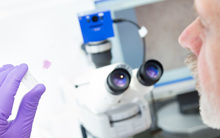Dr Suzy Lishman, President of The Royal College of Pathologists said: ‘The reform of death certification is long overdue. Fifteen years after Shipman’s conviction, it is incomprehensible that the recommended changes have not been implemented. The introduction of the role of medical examiner would provide independent scrutiny of deaths. This has been repeatedly delayed, despite the success of five pilot sites. The proposals have cross-party support and we call on the Government to implement this much-needed reform without further delay.
‘Understanding why people die does not just help provide valuable statistics about the health of the nation, it helps families understand what happened to their loved ones, enables health professionals to improve care for the living and informs policy makers about how limited resources should be invested.’
Changes outlined in the 2009 Coroners and Justice Act would have improved safeguards for the public by introducing the role of an independent medical examiner. This role would have provided scrutiny of all deaths that weren’t referred to a coroner. Medical examiners would also work closely with families to answer questions they may have and address any concerns.
The Francis Report 2013 also recommended the introduction of the role of medical examiners.
Medical examiners would:
- undertake a thorough external examination of the dead person’s body (which could, for example, pick up a high incidence of pressure sores at a particular hospital or care home which might raise issues of quality of care)
- ensure that the right deaths are referred to a coroner·
- improve the quality of certification by providing expert advice to doctors
- avoid unnecessary distress for the bereaved that may result from unanswered
- questions about the certified cause of death.
- discuss the death with a relative to offer an opportunity for them to ask questions about the medical circumstances and cause of a death and to raise any concerns they might have. This could result in the death being referred to the coroner.
Notes for editors
The Royal College of Pathologists is a professional membership organisation committed to setting and maintaining professional standards and to promoting excellence in the practice of pathology.
As well as medically qualified members, the College has scientists amongst its membership and represents 19 pathology specialties.
It has over 10,000 members who are senior staff in hospital laboratories, universities and industry, worldwide. The College is a registered charity and is not a Trade Union. It does not negotiate the· terms of employment of its members.







